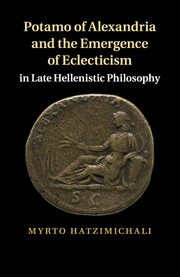Book contents
- Frontmatter
- Contents
- Acknowledgements
- Abbreviations
- Introduction
- Chapter 1 Eclecticism in modern and ancient thought
- Chapter 2 Eclecticism and Alexandria in the first century bc
- Chapter 3 Potamo of Alexandria, life and work
- Chapter 4 The eclectic system of Potamo's Elementary Teaching
- Chapter 5 Potamo and Aristotle's On the Heavens
- Chapter 6 Further references to Potamo
- Chapter 7 Conclusions
- Bibliography
- General index
- Index of passages cited
Introduction
Published online by Cambridge University Press: 05 July 2011
- Frontmatter
- Contents
- Acknowledgements
- Abbreviations
- Introduction
- Chapter 1 Eclecticism in modern and ancient thought
- Chapter 2 Eclecticism and Alexandria in the first century bc
- Chapter 3 Potamo of Alexandria, life and work
- Chapter 4 The eclectic system of Potamo's Elementary Teaching
- Chapter 5 Potamo and Aristotle's On the Heavens
- Chapter 6 Further references to Potamo
- Chapter 7 Conclusions
- Bibliography
- General index
- Index of passages cited
Summary
Eclecticism is not often thought of as representing something new, something that ‘emerges’ as a fresh beginning – the term is used more commonly for intellectual attitudes that are viewed as the end or the anticlimax after a period of development and innovation. This book proposes to examine the circumstances under which an unexpected claim of innovation was made on behalf of eclecticism. Potamo of Alexandria was the only ancient philosopher explicitly to declare himself an eclectic, and what is more, he went on to establish a new philosophical sect under the banner of eclecticism. As discussed in more detail in alongside a survey of ancient and modern applications of the term ‘eclectic’, in ancient philosophy eclecticism has served primarily as a conventional characterisation for many different thinkers such as Cicero, Antiochus of Ascalon, Eudorus of Alexandria or Plutarch, whose views cannot be pinned down firmly to one of the traditional schools (such as the Academy, the Peripatos, the Stoa or Epicurus’ Garden). Many of the problems arising from this characterisation were treated in the volume The Question of Eclecticism, where chapters are devoted to Cicero, Philo of Alexandria and Plutarch among others. The main common feature among ‘eclectic’ or Eclectic philosophers remains the elusive nature of their otherwise diverse ideas. What radically distinguishes the other thinkers from Potamo is that they, formally at least, claimed allegiance to one of the traditional schools.
- Type
- Chapter
- Information
- Publisher: Cambridge University PressPrint publication year: 2011



